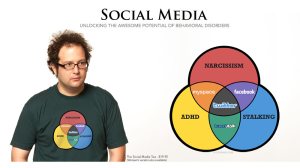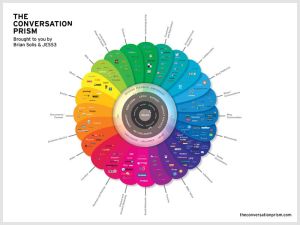Archive
Emotionally invested readers
Whether you are writing a blog for fun or trying to sell a product, most of us want people to read and make some kind of response. I subscribe to copyblogger and in one post Dave Navarro offers four principles to guarantee that your readers will be “emotionally invested.”
1. Get in touch with the pain your reader brings to the table
2. Understand their frustration with “so far” and “out there.”
3. Step them into their “Dream Situation”
4. Close the deal with an “Ideal Solution”
“Living a more human existence”
Another book out there pleading with us to not miss life even though we maintain a constant connection with others on the web. Daniel Flynn reviews Unplugged, a book by William Powers at the City Journal. My favorite paragraph,
“Powers charges that the tools capable of making us more productive often wind up distracting us. Similarly, the more “connected” we are through gadgets, the more disconnected we are from friends, family, and other human beings. “The rushed, careless quality of screen communication is of a piece with the discounting of physical togetherness,” Powers writes. “When everyone is endlessly available, all forms of human contact begin to seem less special and significant.” Think of the curt nature of e-mail; the stupidity of tweets; the use of text messaging to avoid dealing with other human beings; the lack of civility in anonymous blog postings.”
Twitter report
What difference is twitter going to make in your world?
 Declining growth: 13% to 3.5% growth
Declining growth: 13% to 3.5% growth
More engaged: more following, followers and updates BUT
82% have less than 100 followers and 91% follow less than 100
Peak times: Thursday and Friday; any day between 10-11 p.m.
Skyrocketing usage: 1 billion tweets per month, 50 million tweets per day, 600 tweets per second
- Update button is now a verb: Tweet
- Basic question changed from “What are you doing?” to “What’s Happening?”
Thinking about twitter
2009 was the year Twitter boomed. In a survey done in Nov of 2009, it was estimated that between 567, 000 and 1.8 million tweets are sent per hour! Billions of tweets have now been sent!
Have not jumped into either one of these too much yet, still thinking. How can this be used towards the glory of God?
Where in the world is facebook
 If you want to see what social networking sites dominate in your part of the world, check out this map. On the website, there is an interactive map but if you want an overview, here is a static image.
If you want to see what social networking sites dominate in your part of the world, check out this map. On the website, there is an interactive map but if you want an overview, here is a static image.
How important is social networking?
Found a fascinating study by Crowd Science (thanks to Brian Solis) on usage of facebook, myspace and twitter done in August of 2009. Here are some more interesting stats
- 84% of those surveyed had used facebook versus 47% for myspace
- Almost one-third of online social media users in this study feel that they spend too much time using online social media (29%), while one-quarter of online social media users reportedly have said things on online social media that theyʼve later regretted (26%)
- One-quarter feel forced to use online social media because friends and contacts do (25%).
- One third of respondents (32%) would rather communicate with friends/contacts through social media than by telephone.
- While about eight-in-ten disagree that social media are preferable to face-to-face contact with friends, almost one-in-ten actually prefers to use online social media over face-to-face encounters.
- Almost two-in-ten respondents report that using online social media is their favorite leisure activity.
- When examining overlap of the three social media, Facebook users yield the largest proportion of exclusive users (35%), versus MySpace (10%) or Twitter (7%).
- 48% of facebook users are on every day and of those, 17% are on more than 3 hours daily
- 35% of teens are on facebook more than three hours per day. That falls to 20% of the 19-29 group and to 13% of the 30-39 crowd
- Three-in-ten online social media users feel that they spend too much time using online social media and one-quarter feel forced to use online social media because friends and contacts do.
- One-third of females (vs. one-tenth of males)Despite their enjoyment of social media, over one-half of females (54%) under 21 years of age believe they spend too much time on social media – a significantly larger proportion when compared with males (38%). who use social media report that it is their favorite leisure activity
- Despite their enjoyment of social media, over one-half of females (54%) under 21 years of age believe they spend too much time on social media – a significantly larger proportion when compared with males (38%).
Facebook and Faith
What’s happening is the right question
From Brian Solis regarding a change on the question twitter is asking, which is now, “what is happening?”
At the very minimum, Twitter is a barometer for fascination, education, and obsession.
Twitter = what are we doing
Facebook = what we are sharing or reviewing
MySpace = what we are in to
LinkedIn = what’s in it for me
Beyond the blog
 I have been blogging for about three years now. I have had some ups and downs but have kept posting but unfortunately I have not been able to sustain the time needed to look at other blogs around. In the meantime, a lot has happened. I try to stay up with facebook and am barely on twitter. Nice picture above despair.com. Well, tonight, thanks to Brian Solis I have been exposed to an entire new world out there.
I have been blogging for about three years now. I have had some ups and downs but have kept posting but unfortunately I have not been able to sustain the time needed to look at other blogs around. In the meantime, a lot has happened. I try to stay up with facebook and am barely on twitter. Nice picture above despair.com. Well, tonight, thanks to Brian Solis I have been exposed to an entire new world out there.
 Brian has created the conversation prism, a graphic display of what is happening out there and how it might be utilized. Here is a link to a clickable version in which you can see what is actually said. Someone else explains, Each category around the “wheel” represents a different type of conversation.
Brian has created the conversation prism, a graphic display of what is happening out there and how it might be utilized. Here is a link to a clickable version in which you can see what is actually said. Someone else explains, Each category around the “wheel” represents a different type of conversation.
Although Brian’s objective seems focused on the economic importance of understanding what is happening in the social media, there are many things he is saying to which we as Christians need to pay attention! Here are a few gems, I gleaned from some of Brian’s posts. Bold print is my own.
Perhaps most importantly, the process of listening and observing will reveal the cultures of the very communities you may wish to engage.
This is about creating and cultivating relationships with people, online and in the real world, and these relationships are defined by mutual value and benefits.
In the social economy, relationships are the new currency.
Conversations are slowly migrating away from blogs and moving to micro social networks such as Twitter, Pownce, Jaiku, FriendFeed, and now, Shyftr
Furthermore, new micro networks and content aggregators are allowing for comments directly in the aggregated flow or stream, which don’t make it back to the original post. And, that’s exactly where we need innovation. New tools and services that connect those comments back to the source will help create a manageable universe where people orbit the point of origin instead of creating a series of disparate galaxies of conversations around the same idea. But, I guess that’s the evolution that we need to acknowledge, the point of origin is relative to the reader and where they discover the content, not necessarily where we publish it.
As Social Media evolves, the value of online conversations is becoming distributed and decentralized. As the host of any given conversation, it is almost impossible to expect your community to discover or congregate around your content in any one given place, especially the point of origin. It’s both the challenge and the promise of micromedia and social networks. The comments section of your blog, for example may not truly represent the community response or reaction because it may thrive across other disparate networks and communities, whether you’re aware of it or not.
Indeed, conversations are no longer relegated to blogs. Nor are they limited to any one community. Twitter, FriendFeed, Facebook, et al, are not only online neighborhoods (or trendy tools), but they are also forums where your contacts may choose to share their reaction and thoughts directly with you instead of immortalizing those thoughts in the comments section of your blog. Conversations are not only adding layers to the original topic, they’re also more visible and influential than ever before.
Basically, conversation is moving from a very static and slow form of conversation — the comments thread on blog posts — to a more dynamic and fast form of conversation: in to the flow in Twitter, Friendfeed, and others. I think this directionality may be like a law of the universe: conversation moves to where is most social
The best conversationalists are also the best listeners. Conversations are distributed and the tools for finding them are available and increase in functionality every week. It requires a proactive approach to find them, for they may not necessarily find you.
A new definition of friendship?
In an article which I am sure a lot of people will disagree with, Meghan Daum writes about a new understanding of friendship in our social networking world today. She described how a 2004 survey showed few people felt that they had a close confidant. Maybe for the younger crowd, Facebook has helped on the friend front but for those of us over thirty, do we feel any less lonely even if we have hundreds of “friends?” When I am asked to be someone’s “friend” on Facebook and I barely know them, I begin to get a bit overwhelmed. Basically, I am in Facebook to stay connected with the people I care about, to enter into “their world” so to speak. And, for being accepted as their friend, I really appreciate that. Well, here is what Daum wrote. Reactioins.
I think of a friend as an actual person with whom I have an actual history and who I enjoy actually seeing. It seems, however, that this is no longer the definition of “friend.”
A friend is someone on your Facebook page or in your Twitter circle. A friend is someone you might know personally but who could just as easily be the friend of a friend of some other Facebook friend you don’t actually know. In any case, these friends have been assigned value not necessarily because of anything they’ve actually done with you or for you, but because, well, they just exist in the world and so do you.



Recent Comments